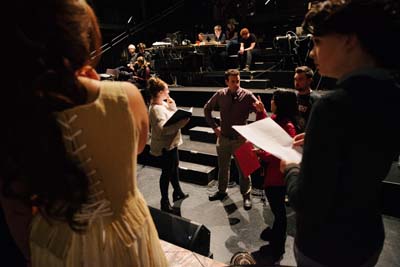TEACHING
INTRODUCTION TO THEATRE - (SYLLABUS)
A general introduction to theatre as a social institution and collaborative performing art. Through a combination of lectures, discussions, class exercises, and excursions to see theatre together throughout Toronto, this course will investigate why and how people commit their lives to make theatre. It will also orient students to the four areas of focus in the Theatre and Performance program's curriculum, providing a background for further theatre studies.
Acting Laboratory - (Syllabus)
This course provides a basic introduction to the work of Stanislavski, exploring script analysis for the actor as well as an experiential analysis of the basic physical, vocal, and analytical tools of the actor’s craft through a series of group and individual exercises, leading to preparation of audition monologues and performance of scenes.
Improvisation: The Power of Play - (Syllabus)
This course challenges students to embrace the challenges of improvisation in a variety of theatrical contexts, and to reflect on those experiences through a rigorous engagement with play theory. In a sequence of short units, we will explore improv-based games, improv comedy, improvisation-based devising work, and the improvisation structures commonly used in the context of applied theatre work (including forum theatre, playback theatre, and sociodrama). Simultaneously, we will be reading scholarly literature in the field of play theory, and processing our own experiences as improvisers through the vocabulary that has been developed in this interdisciplinary field.
WRESTLING WITH THE WESTERN CANON - (SYLLABUS)
This course challenges students to "wrestle" with the Western canon that has dominated the practice of theatre-making in colonized North America. In wrestling with it, students will become more conversant in its forms and norms, and thus better able to enter into dialogue with other theatre practitioners and scholars. They also learn to probe and challenge dominant practices, locating them within the cultural spheres and power structures that led to their initial development.
THEATRE AND SOCIAL JUSTICE - (Syllabus)
This course invites students to consider how theatre can help to close the gap between the just world we envision and the inequitable world we inhabit. Case studies illuminate the challenges that theatre-makers face when confronting injustice, the strategies they pursue, and the impact of their work on their audiences and the larger society.
Directing FOR THE THEATRE - (Syllabus)
This course introduces students to the work of the director. A combination of lecture, discussion, reading, and practical work will challenge students to consider how to lead the creative teams that create performance. Students taking this course will need to devote a considerable amount of time outside of class to rehearsing class projects and will need to recruit collaborators for these projects.
DEVISING - (Syllabus)
This course engages students in an experiential study of devised theatre, a contemporary practice wherein a creative team (including actors, designers, writers, dramaturgs, and often a director) collaboratively create an original performance without a pre-existing script. We will explore how an ensemble uses improvisation, self-scripted vignettes, movement/dance, and found materials to create an original piece of theatre. Students will engage in a reflective practice that integrates the processes of research, conceptual design, creation of original work, reflection on that work, and reading about the process of devising.
THEATRE LABORATORY [FORMERLY "Applied Performance Techniques"] - (syllabi)
Theatre Laboratory is a class in which students, faculty, and staff work together to create departmental stage productions. In this class, students learn about different parts of making theatre—from onstage to backstage work—that are required to make a theatre production. Students also learn the arts of collaboration and producing. Students may repeat this course for credit, and each time a student takes this class they can experience a different production role. Roles available include actor, dramaturg, designer, stage manager, assistant director, and more. This course is offered for either one-half or one full Reed unit. For the full unit, students will study critical writing and research about theatre, and write a full-length, rigorous research paper that critically analyzes their process and the performance of their production role.







